When it comes to eating habits able to boost your metabolism, burn calories, and facilitate the conversion of fat into lean muscle, getting more protein should be at the top of your list. That said, strength and lean physique are not the only indicators of health. After all, even the beefiest bodybuilders aren't impervious to serious medical conditions like diabetes, heart attacks, Alzheimer's, stroke, and other illnesses that scientists and healthcare professionals have historically linked to diet quality. So, how do you set the stage for an increased intake of protein while also taking your other nutritional needs into consideration, especially if trying to lose weight? This lies within the power of high-protein superfoods.
I'm sure you're probably wondering, "What does that even mean? Were these foods bitten by a radioactive spider?" Not exactly—but I would venture to guess that the nutritional power of high-protein superfoods would even impress the likes of Spider-Man.
What puts the 'super' in superfoods?
"The definition of a 'superfood' is a nutrient-rich food considered to be especially beneficial for health and well-being," says Amy Goodson, MS, RD, CSSD, LD, author of The Sports Nutrition Playbook and member of our Expert Medical Board. "The term, however, means different things to different people."
Lauren Manaker, MS, RDN, registered dietitian and author of The First Time Mom's Pregnancy Cookbook and Fueling Male Fertility, concurs—adding that technically speaking, "there is no formal classification for superfoods."
Although the term has a subjective connotation, superfoods do share a few common characteristics. "As a registered dietitian, I like to help people think of it as a food that provide more than just carbohydrates, protein, fat, vitamins, or minerals; it's a food that has added nutritional benefit," explains Goodson.
"Superfoods are going to be those foods that have that extra edge," adds Amanda Sauceda, MS, RD."They're going to be foods that are nutrient-packed and can benefit different parts of your body."
According to Andrea Senchuk, MHSc, registered dietitian, superfoods are minimally processed items that meet at least one of the following criteria:
- "They are nutrient-dense."
- "They contain a high amount of an important or rare nutrient, like selenium in Brazil nuts."
- "They contain non-nutrient components that benefit human health, like antioxidants in blueberries."
"Examples [of the added nutritional benefits of some superfood] would include antioxidants, as they help fight free radicals in the body that can potentially cause damage to our cells," adds Goodson. "[Also,] an omega-3 fatty acid because it can help buffer free radicals that cause inflammation in the body, as well as help raise HDL ('good' cholesterol). So, [they are] foods that have a greater nutritional capacity than just the basics."
The power of high-protein superfoods
"The bigger delineation in protein is complete—or 'high-quality'—versus incomplete," Goodson explains. "'Complete protein' means it provides all of the essential amino acids that your body cannot make. This includes all animal foods/proteins, [like] meat, pork, poultry, fish, dairy, eggs."
"There are some plant-based foods that are considered 'complete proteins,' like soy foods, tempeh, quinoa, buckwheat, amaranth, pistachios, hemp seeds, chia seeds, and spirulina," she adds. "The rest are considered 'incomplete,' meaning they provide some, but not all of the essential amino acids."
Whether you feast on complete or incomplete protein, it's clear that this macronutrient is one of superfoods' many superpowers. Protein promotes organ health, tissue building, and muscle repair. It is also considered key foundational elements in bone, skin, muscle, and cartilage formation. Combine the superpower that is protein with the arsenal of benefits stemming diverse spectrum of vitamins and nutrients in superfoods, and you'll be able to fortify your overall health in a number of fantastic ways. But which high-protein superfoods can offer more than just your friendly neighborhood superfoods?
Keep reading to learn more about some of the healthiest high-protein superfoods you can eat, plus delicious, creative tips to help you incorporate more of them into your diet with ease.
Eggs
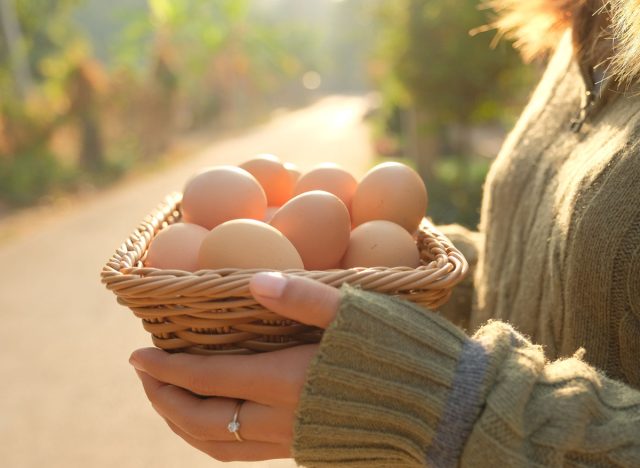
What makes this high-protein superfood so super:
"At around 78 calories, one large egg offers 6 grams of high-quality protein that keeps you feeling full," says Mara McStay, MS, RD. Eggs are also loaded with more than a dozen vitamins and minerals, including choline, selenium and vitamin D. The antioxidant content of eggs also contributes to its superfood status. Eggs are a versatile food, simple to prepare and delicious."
"An egg provides choline, a nutrient important for brain health including memory, thinking, mood and more," says Goodson. "It also provides lutein and zeaxanthin, two nutrients that are important for high health and can help protect your eyes from blue light emitted from screens."
How to enjoy this superfood: Scrambled, poached, or used in an omelet, there's an egg recipe out there for almost everyone. Level-up this high-protein superfood's nutritional impact by combining with veggies via our recipe for a Loaded Vegetable Frittata.
Pistachios
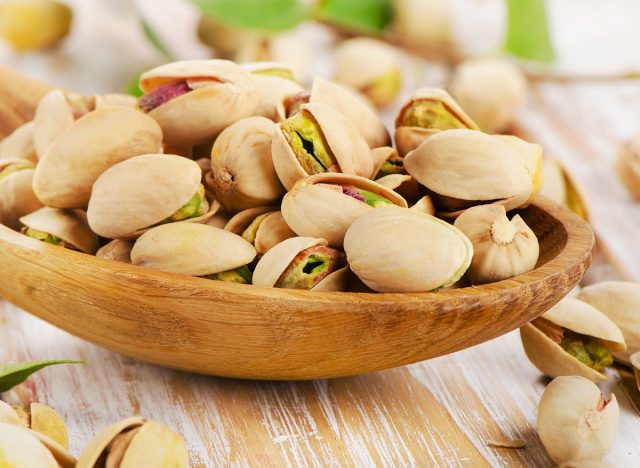
What makes this high-protein superfood so super?
"Pistachios are a superfood that contains protein," says Manaker. "Not only are people getting protein when they eat these nuts, but they are also getting a boost of antioxidants, fiber, and phytonutrients."
Research shows that pistachio consumption is said to have anti-inflammatory properties and has been linked to improved cognitive function and reduced to beneficial outcomes in instances of high blood pressure, diabetes, cardiovascular disease, and even cancer.
Lean beef
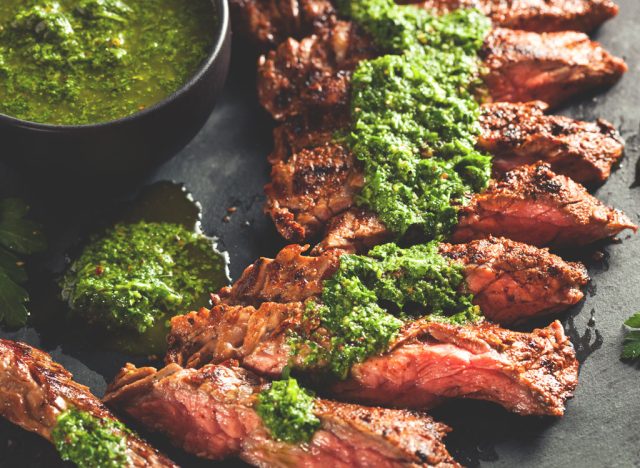
What makes this high-protein superfood so super?
"Lean beef is one of the best sources of zinc and iron—two nutrients that many people are not getting enough of in their diets," says Manaker. "Plus, the protein found in lean beef is highly absorbable, too."
"Beef provides 10 essential nutrients, including the superfood component antioxidant selenium, which can help fight free radicals in the body," adds Goodson. "It is also an excellent source—providing 20% or more of the Daily Value (DV)—of the following nutrients: vitamin B12, zinc, iron, niacin, and vitamin B6," she says. "Vitamin B12 is mostly found in animal foods, and beef is big provider of it."
Lentils
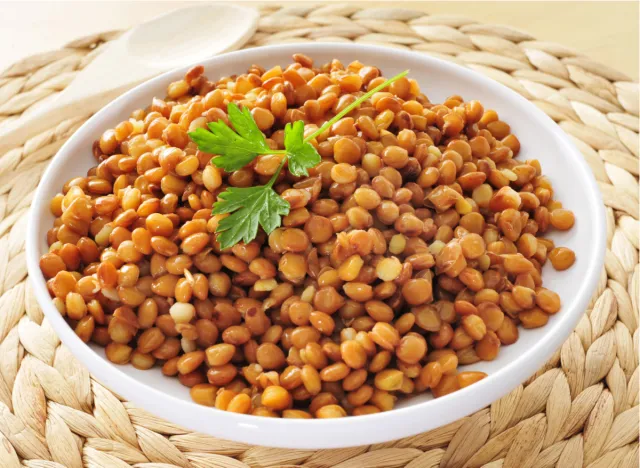
What makes this high-protein superfood so super? This high-protein superfood is not incredibly satiating, but it's high-fiber content lends itself to supporting healthy digestion. Lentils are also low in sodium, saturated fat, and polyphenols, which studies show are associated with antioxidant activities.
Salmon
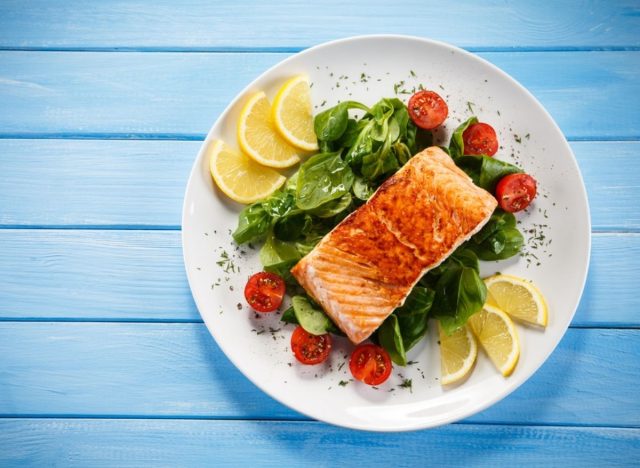
What makes this high-protein superfood so super?
"Salmon is a source of high-quality protein that also fuels the body with good fats and a slew of micronutrients," explains Manaker.
"Incorporating salmon into your diet is a must-have high-protein superfood," adds Dani Lebovitz, MS, RDN, a pediatric dietitian and founder of Kid Food Explorers. "This versatile fish packs 25 grams of protein per 3.5 oz., along with omega-3 fatty acids, and is an excellent source of B vitamins important for red blood cell production and converting food into energy."
"Salmon is one of the best sources of omega-3 fatty acids in the diet, its true superfood component. Omega-3s are the heart healthy fats that can help increase HDL (or 'good' cholesterol), and can help buffer the free radicals that can contribute to inflammation in the body," says Goodson. "Salmon also is a good source of vitamin D, a nutrient that is hard to find in the diet other than in dairy milk. It is also an excellent course of the antioxidant selenium."
Black beans
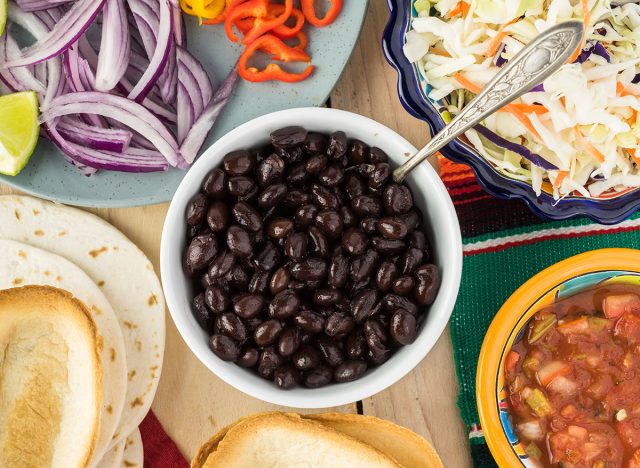
What makes this high-protein superfood so super?
"Beans bring it, when it comes to protein and superfood profile. They can promote heart health thanks to their fiber and potassium. Black beans are also rich in anthocyanins which can have antioxidant properties," says Sauceda.
How to enjoy this superfood: Another high-protein superfood double-whammy, our recipe for a Black Bean Omelet is an ideal breakfast to kick off a productive day.
Kamut
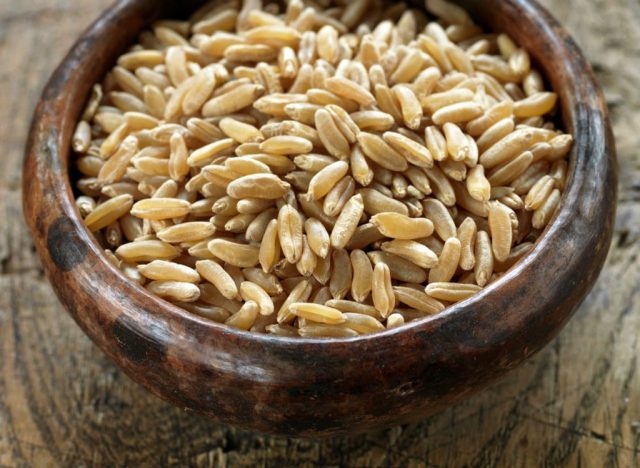
What makes this high-protein superfood so super?
This buttery, nutty grain is not only high in protein, but also selenium, amino acids, and vitamin E. One study published in the European Journal of Clinical Nutrition found that kamut can help reduce blood sugar, LDL (or "bad" cholesterol), and cytokines, which can cause inflammation throughout your body.
How to enjoy this superfood: This ancient grain is a great base for many modern flavors. We recommend a simple yet hearty high-protein superfood-packed kamut pilaf with kale, roasted pumpkin seeds, and roasted squash.
Chickpeas
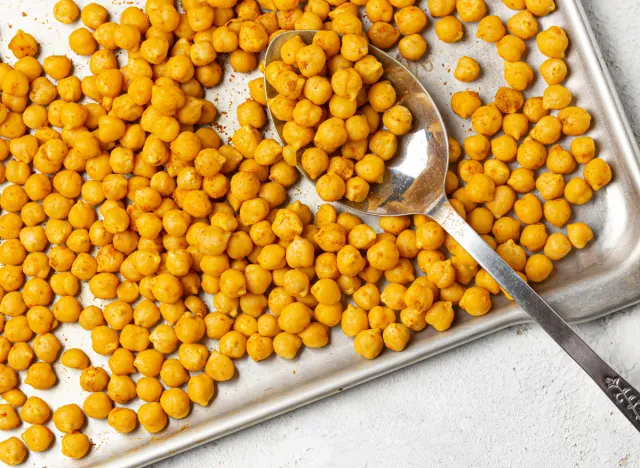
What makes this high-protein superfood so super? T
This protein-rich superfood also contains folate, fiber, iron, magnesium, manganese, phosphorus, among many other vitamins and minerals. Chickpeas are also considered a complete protein because they contain all essential nine amino acids our bodies need, but cannot make on their own.
Cottage cheese
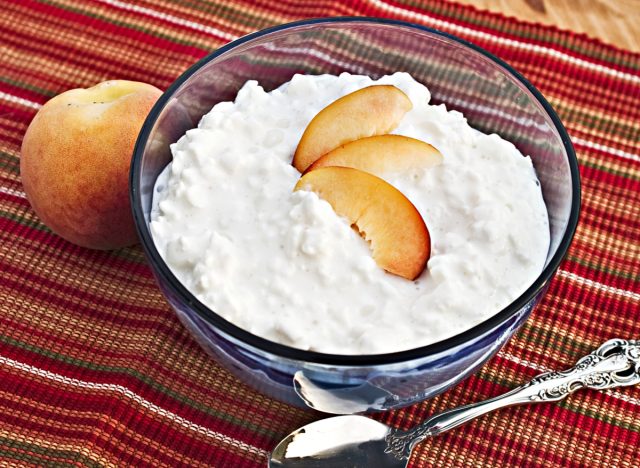
What makes this high-protein superfood so super?
"Cultured cottage cheese is a protein-power superfood. Cottage cheese is naturally high in protein, and when it's cultured, it's even better," explains Amanda Sauceda, MS, RD. "A cultured cottage cheese will contain live and active cultures which means you'll get probiotics that can have benefits for your gut and beyond."
Quinoa
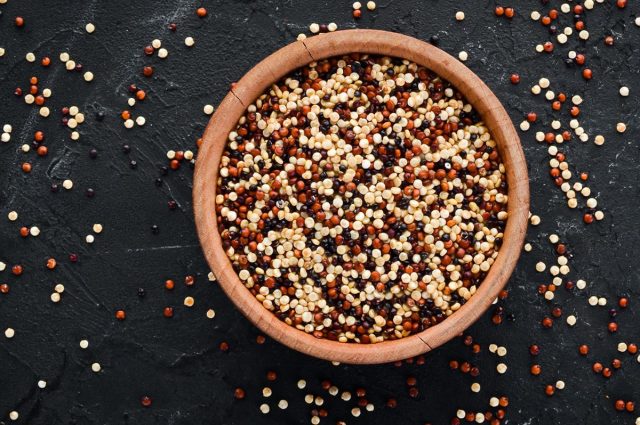
What makes this high-protein superfood so super?
Like chickpeas, quinoa also contains all essential nine amino acids our bodies need but can't produce organically, thus qualifying it as a complete protein. It's also a great source of manganese, phosphorus, vitamin B1, folate, and magnesium, which aids in energy production, muscle function, blood pressure management, and blood sugar control.
Amaranth
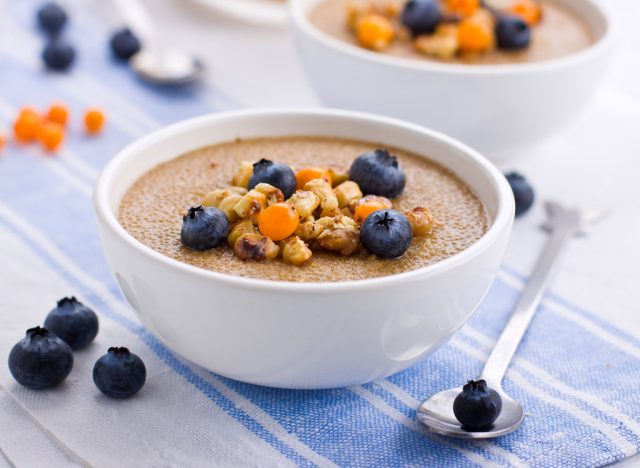
What makes this high-protein superfood so super?
Whether used in savory pilaf or a sweet porridge, this high-protein grain serves as an excellent source of a many vitamins and minerals, like magnesium, calcium, potassium, phosphorus, iron, manganese, and immune system-boosting zinc. Amaranth is also incredibly high in fiber, exceeding the fiber and protein content of both brown rice and wheat. Studies show this superfood has antioxidant properties and can also aid in lowering blood pressure and "bad" LDL cholesterol.
How to enjoy this superfood: More nutritious than even oatmeal, amaranth porridge is a great base to complement a variety of fruits and nuts. You can also thicken the texture and up the protein content even further by adding a dollop of nut butter.
Chia seeds
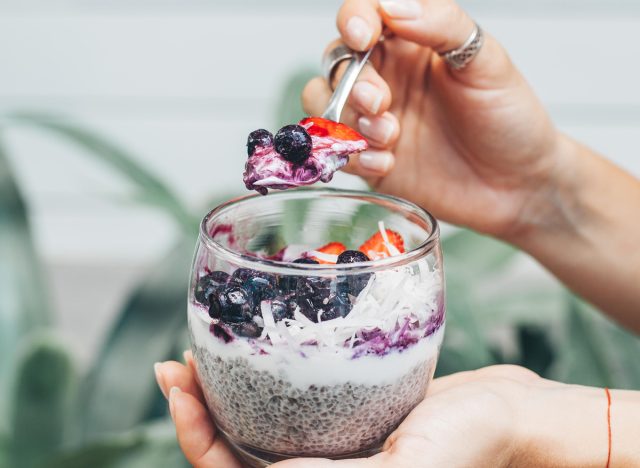
What makes this high-protein superfood so super?
"[Chia seeds have] almost 5 grams of protein per 2 tablespoons, as well as a super nutrient-dense boost of omega-3 fatty acids, powerful antioxidants, vitamins, and minerals, combating inflammation," says Lebovitz.
"Chia seeds are a great protein superfood; 100 grams of chia seeds have 16.5 grams protein," says Moushumi Mukherjee MS RDN. "It is a great source of fiber, calcium, magnesium, and omega-3s, which makes it a superfood. They offer all nine essential amino acids, making it a great vegetarian protein source."
"[Chia seeds are a] great for anyone trying to stay healthy, lose weight—it keeps you full and has a good amount of fiber," adds Mukherjee. "Chia seeds also have been proven to help with better blood sugar control, and are great for anyone trying to increase fiber in their diet."
How to enjoy this superfood: "Chia seeds added to smoothies, pudding, and baked goods are the perfect [way] to add protein," suggests Lebovitz.
Pumpkin seeds
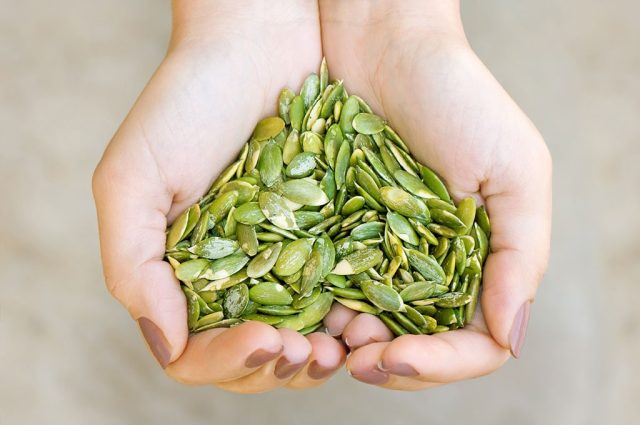
What makes this high-protein superfood so super?
In addition to being high in protein, pumpkin seeds are also high in iron, potassium, phosphorus, magnesium, and zinc. They've also known to be an antioxidant and also have anti-inflammatory, antimicrobial, and anticancer effects on the body, according to many scientific studies.
How to enjoy this superfood: Instead of croutons, add a high-protein crunch to your salad using our recipe for Roasted Pumpkin Seeds. You can also enjoy this superfood straight-up by the fistful as a savory afternoon snack.
Tempeh
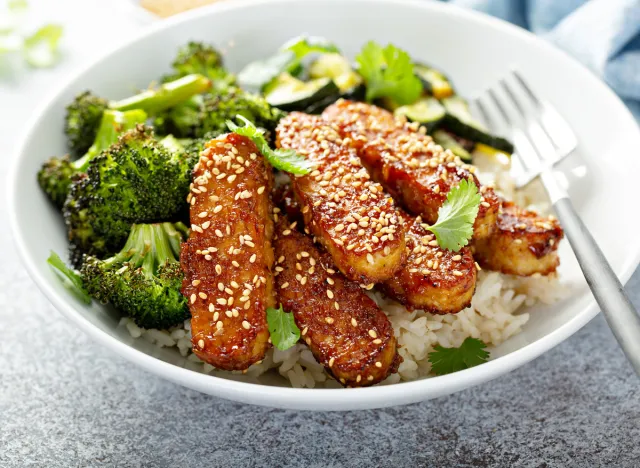
What makes this high-protein superfood so super?
"Tempeh is a minimally processed fermented soy product. Their nutrient density, high fiber, and low saturated fat content make them a superfood in my book!" says Lori Alizieri Stevens, RD.
"Soy is a great source of B vitamins, especially folate, as well as minerals like calcium and magnesium. [Also,] soy has been linked to reduced risk of some cancers." In fact, one study published in Frontiers in Nutrition noted a that greater soy intake was significantly linked to a 10% reduced risk of cancer incidence.
Edamame
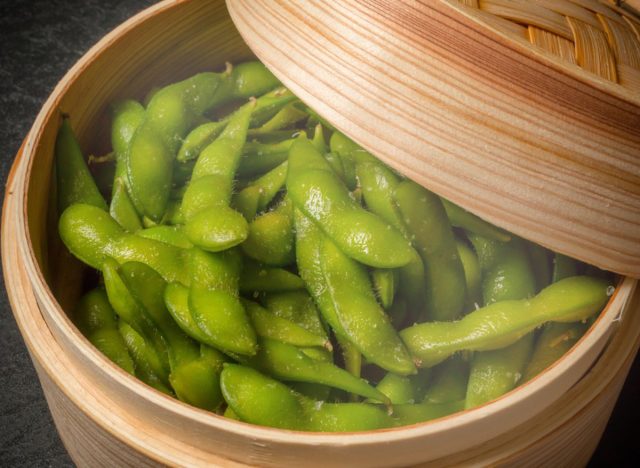
What makes this high-protein superfood so super?
Along with being high in protein, these immature soybeans are another complete protein containing all nine essential amino acids. They are also a superb source of vitamin K, iron, calcium, potassium, magnesium, fiber, and antioxidants. Studies also suggest that they may lower LDL cholesterol, help regulate your blood sugar, reduce the risk for certain cancers, and may even help manage menopausal symptoms.
How to enjoy this superfood: "They can be eaten steamed or roasted for a crunchy snack," says Stevens.
Brazil nuts
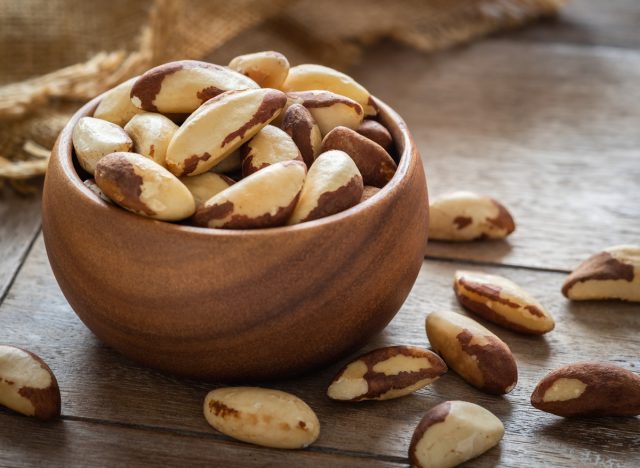
What makes this high-protein superfood so super?
As Senchuk previously noted, Brazil nuts are unique because not only are they protein-rich, but also they contain selenium—a nutrient that, according to Harvard T.H. Chan School of Public Health, can "help to make DNA and protect against cell damage and infections; these proteins are also involved in reproduction and the metabolism of thyroid hormones."
How to enjoy this superfood: Jazz up your usual trail mix by throwing in a handful of these high-protein, South American snack.
Bone broth
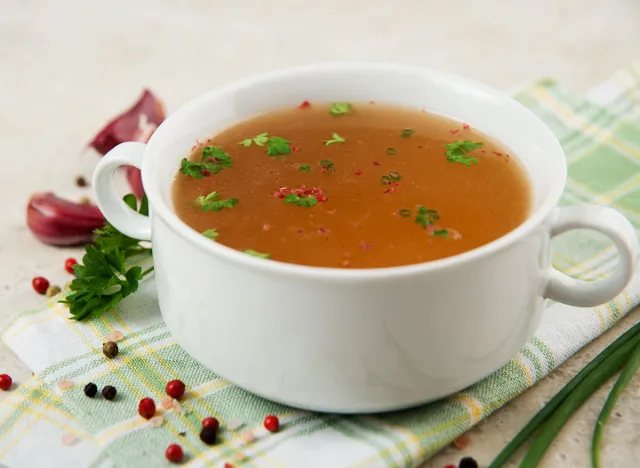
What makes this high-protein superfood so super?
"Bone broth is a high-protein super food that contains specific amino acids and nutrients linked to decreased inflammation, better gut health, and less joint pain," says Bianca Tamburello, RDN. "And there's more, the collagen and amino acids in bone broth may improve skin elasticity and moisture for a natural glow and promote better sleep."
How to enjoy this superfood: "As a registered dietitian, I recommend Azuluna Farms Chicken Bone Broth because it's pasture-raised and packed with a whopping 14 grams of protein and 8 grams of collagen in just 8 ounces."
Almonds
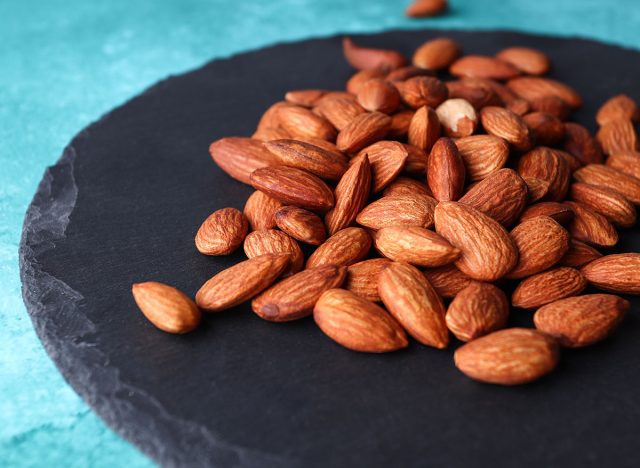
What makes this high-protein superfood so super?
Although almonds may be tiny, their protein-packed punch is mighty. Along with being high in protein, almonds are also rich in antioxidants, healthy fats, vitamins, and minerals—including B2, fiber, manganese, and magnesium. Furthermore, research suggests that these vitamins and minerals have been associated with helping to lower the risk for Alzheimer's, cancer, heart disease, and can promote healthy blood sugar and blood pressure levels. As a filling and nutrient-dense snack, they can even help you cut calories.
Yogurt
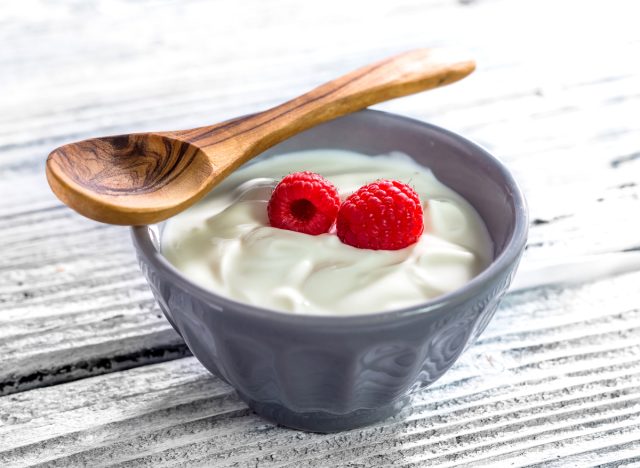
What makes this high-protein superfood so super?
"One cup (8 oz.) of yogurt provides approximately 12 grams of protein and just under 50% of your daily calcium needs," says Goodson. "Its superfood component is probiotics. These are the live and active bacteria (good bacteria) that promote gastrointestinal health and have been shown to help with digestion as well as reduce negative digestive symptoms like gas, bloating, diarrhea, etc."
A2 milk
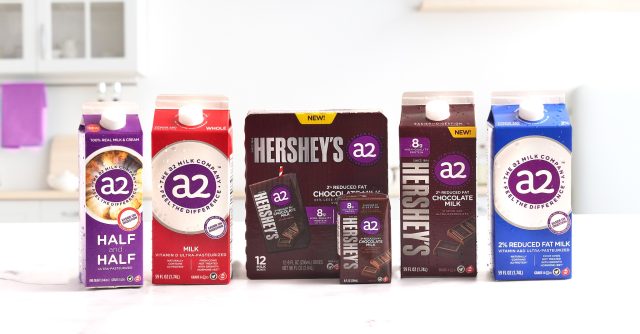
What makes this high-protein superfood so super?
Another dairy superfood, the nutrients in A2 milk are beneficial to your body in more ways than one.
"A2 milk contains the numerous nutrients milk is known for: protein, calcium, B vitamins, phosphorus, potassium, vitamin D, etc. But unique to A2 milk is the absence of the A1 variant of the beta-casein protein, which is thought to be the problematic pro-inflammatory component in cow's milk," says Senchuk. "Without that pesky A1 beta-casein, milk might make a comeback as a respected, high-protein, bone-building superfood."
"A2 milk might help with constipation, but we still need more research," adds Senchuck.
How to enjoy this superfood: A2 milk can be a great addition to smoothies. For a colorful, superfood-packed breakfast, you can also pour A2 milk over a warm muesli bowl with blueberries, shaved coconut, and roasted pumpkin seeds.
Black-eyed peas
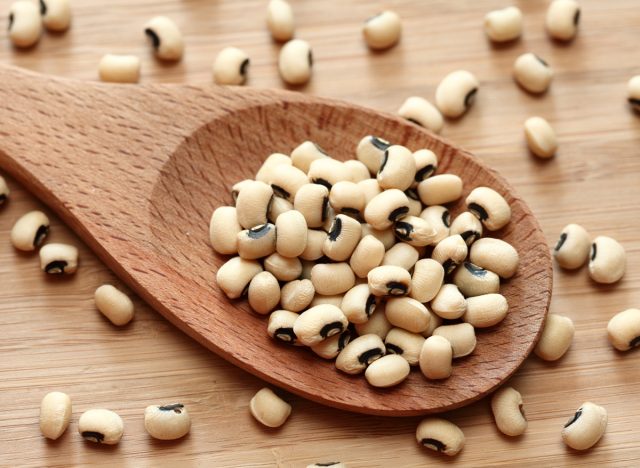
What makes this high-protein superfood so super?
Black-eyed peas are not only high in protein, but they also contain about 6 grams of dietary fiber and around 3 grams of iron per cup, equating to 26% and 16% of your Daily Value, respectively. They're also a great source of magnesium, accounting for 21% of your Daily Value for this mineral.
How to enjoy this superfood: Black-eyed peas are a nutritious soul food staple. To capitalize on their benefits, stew with smoky chicken sausage and spices, and serve alongside a sautéed leafy green medley of collard greens and kale—and don't forget the hot sauce!